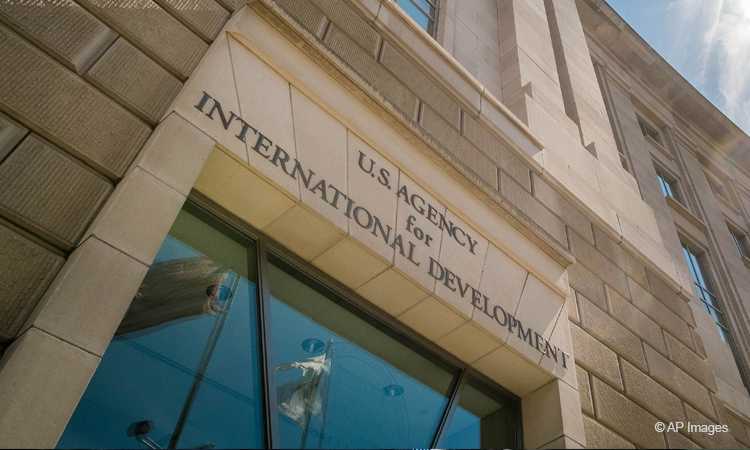
On September 12, 2023, Administrator Samantha Powers of the US Agency for International Development (USAID) unveiled a new Biden administration policy on federal collaboration with faith-based organizations. USAID’s new “strategic religious engagement policy” is detailed in the document Building Bridges in Development. USAID is the agency that leads federal efforts to promote overseas development and to respond to overseas humanitarian disasters. The new policy is a commitment by USAID to expand its partnerships with US faith-based relief and development organizations and with overseas faith communities and religious leaders. Designed by an administration often seen as antagonistic to religion’s influence in society by some religious communities, religious freedom advocates, and faith-based organizations, this is a very welcomed and highly significant policy.
In announcing the policy at an event at the US Institute for Peace, Administrator Powers quoted Madeleine Albright, Secretary of State in the Clinton administration, who said “Religion is a large part of what motivates people and shapes their views of justice and right behavior, {and] it must be taken into account.” Powers added,
“In my travels to the communities that we serve around the world, I have seen how faith-based leaders are often the most trusted and effective changemakers in their communities. I’ve witnessed their unique ability to draw from wide networks to convene important, difficult conversations, to bring people together and to inspire action. And I’ve seen how during times of crisis, which sadly there are too many of these days, they are often the first to arrive and the last to leave. Many have committed their lives to fighting for justice and caring for those with the greatest needs, grounded in the principles of their faith and living out their religious conviction in a way that uplifts humanity and inspires us all. And when we partner with these changemakers, the results can be extraordinary.”
As Powers also noted, USAID has always carried out its work in partnership with US and overseas nonprofit organizations and local communities, including faith-based organizations and houses of worship. (For the early part of that history, see J. Bruce Nichols, The Uneasy Alliance: Religion, Refugee Work, and U.S. Foreign Policy, 1988.) The goal of the new policy is to expand such partnerships so that the federal government’s efforts to aid people and communities can be more effective.
What new programs, funding, and innovative methods are promised? Actually, the key reforms are simpler and also more significant—one reform internal to USAID and one reform to the communications between the agency and faith-based organizations and religious communities.
The internal reform is to assure, instruct, and train USAID staff not only that the agency may enter into collaborations with religious organizations and communities but also that it must not avoid such collaborations due to misinterpreting or ignoring constitutional principles and federal church-state rules. Faith-based organizations are as welcome as their secular counterparts to work with USAID and are equally eligible to compete for federal funding.
The purpose of the communications reform is to spread that same message outward. USAID staff and publications must more vigorously and clearly convey to faith-based organizations and to religious communities that USAID values their work of serving their neighbors and their social impact, and that it desires to expand its collaboration with them. This must be active communication: not simply having an open door but creating ways to communicate about that open door to communities, leaders, and organizations that have thought they were excluded.
These religion-specific actions go along with two fresh USAID emphases. One initiative, stretching back to the Trump administration, as does this new religious engagement policy, is to simplify USAID rules and processes so that smaller organizations and those new to collaboration with government are not defeated by the very complexity and burden of government requirements. The other is a stress on “co-creation” of programs by USAID in partnership with local organizations so that federal funds can support activities that spring from and take into account local knowledge, local assets, and local goals.
All of this is positive news, promising more effective USAID assistance and more extensive and more effective collaboration between USAID, with its many resources, and faith-based organizations, domestic and abroad. But two cautions need to accompany the praises. And the very existence of the new policy demands a clear-eyed judgment about the anti-religious bias of government policy.
First, there is a troubling emphasis. The policy statement rightly references the religion clauses of the First Amendment as foundational for USAID engagement with religious organizations and communities, and it names the First Amendment’s protection for religious exercise as well as its prohibition of the establishment of religion. Yet it is the danger of establishment that the document particularly stresses. And while it promises more training so that USAID staff will fully understand that faith-based organizations have an equal opportunity to compete for agency funding, it casts some doubt on that training by telling staff to “consult early and often” with the agency’s legal staff.
Second, the policy is not clear about USAID’s nondiscrimination requirements. USAID intends to engage with a broad range of religious communities, religious leaders, and faith-based organizations. After all, these people and organizations, with their varied beliefs, moral values, and practices, are all vital elements of the diverse societies where USAID works. But, at the same time, USAID insists that its resources and operations should not be discriminatory on a wide range of characteristics, including religion, sexual orientation, sex, and gender identity. USAID itself, of course, as a government entity, has to treat everyone equally. And it rightly requires that the organizations it finances also should serve well everyone who is eligible. However, what can all of this mean when working with diverse organizations with their diverse standards, seeking to serve diverse populations? Can USAID only provide funding to religious organizations that serve everyone without regard to religion, or is it required, rather, to take care that it works with a wide range of religious organizations to ensure that adherents of the many different religious communities can all find a trusted service provider, even if some of those providers, for religious reasons, serve only some people? Must all of its religious partners serve everyone without regard to sexual orientation, sex, and gender identity, or, instead, must USAID itself ensure that among the providers it supports there is at least one organization hospitable for every one of the people eligible for services?
USAID contractors and subcontractors may not engage in employment discrimination on the grounds of religion, sexual orientation, or gender identity—except that the regulations include a religious exemption for religious contractors and subcontractors so that they can make employment decisions based on religion. But can a religious contractor refuse on religious grounds to hire someone who disregards the religion’s teachings about marriage and sexuality? With respect to faith-based organizations that receive USAID grants or subgrants, the agency’s regulations clearly set out a wide range of religious freedom protections—but there is uncertainty here, too. Their right to hire based on religion is clearly stated in the regulations, but USAID pushes all of its grantees to adopt a broad nondiscrimination policy. Based on the laws and regulations that apply to its own operations, USAID says that it prohibits, in its own workplaces, discrimination “on the basis of race, color, religion, sex (including pregnancy and gender identity), national origin, disability, age, veteran’s status, sexual orientation, genetic information, marital status, parental status, political affiliation, and any other conduct that does not adversely affect the performance of the employee.” The same broad set of nondiscrimination requirements are not legally binding on its grantees, USAID admits. However, it states in its official policies that it “strongly encourages” its grantees to adopt the same comprehensive set of nondiscrimination requirements themselves. Does this mean that, to be competitive, a faith-based applicant for USAID grants should mask or abandon its religion-based conduct standards for employees?
The Building Bridges document cannot address these complex matters in detail, to be sure. Still, for faith communities, religious leaders, and faith-based organizations with morally conservative standards to be assured that they are welcome as USAID partners, something more is needed than the aspirational statement that “the principle of belonging aims to balance the respect for distinct worldviews with universal principles of human dignity and authentic relationships that span across communities.”
Finally, but not least: USAID’s announcement of a new religious engagement policy is both encouraging and disheartening. Encouraging because this is what every government agency must do: not only end every policy that discourages engagement with and support of faith-based organizations and religious leaders but also actively design ways to partner with such organizations and leaders even as it builds connections with nonreligious organizations and leaders. Disheartening because exactly such a policy of religious engagement supposedly has been the policy of every federal agency for more than two decades! By adopting Charitable Choice rules as part of federal welfare reform in 1996, Congress and the Clinton administration set a new path for the federal government of equal access to funding for faith-based and secular providers. In inaugurating in 2001 the White House Office of Faith-Based and Community Initiatives, and counterpart faith-based Centers in various federal agencies, President George W. Bush committed the whole federal government to a new era of partnerships with faith-based organizations to correct the conventional government bias of favoring secular providers. That Bush policy—a White House commitment and officials, Charitable Choice and Equal Treatment regulations, agency commitments and Centers, reforms to the grants process and innovative new programs—has been maintained, at least as a matter of statements and written principles, by subsequent administrations, both Democratic and Republican.
That USAID, more than twenty years later, has had to create a new religious engagement policy, demonstrates that its own staff and many of the organizations and communities it would like to partner with do not grasp that federal collaboration with religious organizations is constitutionally required and already is the stated federal policy. This illustrates the urgent need for the federal government to swiftly learn how to walk the talk of its two-decade commitment to the faith-based initiative.
Stanley Carlson-Thies is the Founder and Senior Director of the Institutional Religious Freedom Alliance (IRFA), a program of the Center for Public Justice.





